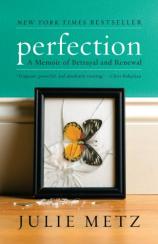Author Talk: June 19, 2009
AUTHOR TALK
June 19, 2009
In her debut, PERFECTION, Julie Metz chronicles her difficult journey of acceptance and moving forward after she discovers painful truths about her marriage following her husband's unexpected death. In this interview, Metz explains the significance behind the book's title and discusses how, in retrospect, she could have foreseen her husband's betrayal. She also elaborates on the double standard that exists in today's society regarding infidelity, offers tips to women looking to start over after being cheated on by their spouses, and shares what she hopes readers will take away from her experiences.
Question: Do any of Henry’s character traits stand out as indicators of his infidelity?
Julie Metz: Henry was a charming man with a huge amount of charisma. On the surface he was a super confident extrovert. Personally, I tend to distrust that kind of charisma now. I want to see what’s under the surface. I also see that there are men and women who are able to put different parts of their lives in separate boxes. These people are attracted to new partners and activities, only to become quickly disillusioned or bored. So when I see people who seem to change everything about their personality to suit a situation, I begin to wonder where their authentic self is.
Q: What made you decide to seek out every woman with whom Henry was unfaithful?
JM: At the time I didn’t hesitate for a minute. I couldn’t imagine any other way to find out what had happened and why. Henry had become a stranger to me, I felt a strong desire to understand who he really was, and I couldn’t ask him anymore. I also wanted to understand what had gone on in these women’s minds, how they had rationalized their own choices. I felt that these women owed me an explanation for their damaging behavior.
Q: In retrospect, could you have foreseen Henry being unfaithful to you with your friend, Cathy?
JM: I think all my instincts were screaming at me to notice what was going on, for one thing, how much time they spent together when neither her husband nor I were around, but I just didn’t want to look. I had so much at stake in saving our marriage, mostly our child. I think many women are in that situation. A lot of women are ashamed that they didn’t notice what was happening right under their noses, but I can understand that fear of looking too closely.
Q: What do you think you would have done if you had found out about Henry’s affair while he was still alive?
JM: I am sure that Henry would have begged me for forgiveness and I would have tried to forgive him because we had our young child together. I believe, however, that his infidelity was of a chronic nature and I think we would have separated eventually.
Q: After your experience and hearing stories from other women, do men and women cheat for different reasons?
JM: Affairs happen because an opportunity presents itself: someone shows that they are sexually available to you, an emotional connection with a married friend crosses the line, you meet someone at your job. Men and women begin affairs for the novelty and excitement, because they are lonely, because they are going through a time of stress, or because their existing relationship has become asexual. For men and women with addictive personalities like Henry, having affairs is like a drug.
Q: We consider cheating the worst thing a woman or mother can do in our society. If a guy cheats, we don’t like it either, but it is more expected. Do you think it’s become more common for women to be unfaithful? If so, why do you think so?
JM: Infidelity is hard to quantify, because research is based on honest answers, and infidelity is about keeping secrets. Statistics indicate that men are more likely than women to be unfaithful, but I think women’s lives have changed dramatically in such a short time that those numbers are changing. Women are much more out in the world with careers, and the internet provides tempting opportunities for affairs we didn’t have before. And it seems like women are becoming more comfortable reporting their infidelity.
Q: What are three critical signs of potential infidelity women should look out for in their partner?
JM: I think that women should work first on paying attention to the details of their lives without fear or shame. If you are paying attention, you will notice and react to changes you observe in your marriage and partner’s behavior. Has your sex life changed? Is your husband spending a lot of time “late at work?” Does he talk frequently about a new co-worker or spend time with a woman friend? Has he changed some aspect of his appearance, is he spending a lot more time at the gym? From my own experience I’d say that the most important thing is to trust your instincts. Do you feel some vague sense of dishonesty in your relationship? It is important not to let your pride, fear, or shame keep you from trusting those instincts.
Q: Can a couple recover from infidelity?
JM: In the end it’s less about the sex, it’s the lying that damages the trust required to sustain an intimate relationship. I know several couples that have recovered from infidelity. In these cases the cheating partner has immediately expressed remorse when confronted and both partners were motivated to renew the marriage because they had young children and because they still felt committed to each other. Rebuilding trust can take many years of work. It will be difficult to recapture the innocent time before the infidelity. Many couples can’t recover because the cheater shows no signs of changing his or her behavior or because the victim cannot overcome the anger and grief that follow the revelation of an affair.
Q: What recommendations do you offer to women who want to start over after a spouse or partner has cheated?
JM: First, I think a woman should establish a good support system of friends, family, and, if possible, professional advice. With time and patience you can work on forgiveness, which is essential to moving on with your life. When you get to the place where you are ready for forgiveness, first forgive yourself. I felt so much shame in the aftermath of my husband’s infidelity, as if I had done something to deserve it. As your anger subsides, you might even be able to find some forgiveness for those who have betrayed your trust. Then you can move forward and rebuild your life. In my own case I did a kind of personal history, looking back over my marriage and prior relationships for patterns. I felt strongly that I did not want to be alone but I knew that I had to look for a different kind of partner.
Q: How can women regain their ability to trust their own instincts and a new partner?
JM: It takes practice to learn new habits, but I think you have to value your intuition. I made great effort to choose a very different partner who shared core values and showed me through his actions, not just his words, that he was kind and generous. I really did count on my daughter. Having a child really sharpens your perspective because you put them first. I am lucky that my daughter is direct with her feelings, so I am learning from a master.
Q: As the mother of a young child, why did you write such an open book about sexuality and relationships?
JM: I see my story as a cautionary tale. There seems to still be something quite puritanical about our view of mothers, as if we are women who no longer have real desires and disappointments. I hope that my daughter and other young women can learn something from my painful experience.
Q: Why did you decide to include Henry’s emails as part of the text?
JM: I felt that it was important to see the emails because this shows the complete disconnect between his life with me and his alternate life. Nothing else would communicate that fully. I thought that for many women it would be important to understand this disconnect --- how a man can say he misses his wife in one line and invite his mistress to dinner in the next. There would have been no better way, I think, to make Henry "present" in the story, for the reader to hear his "voice" and to have "evidence" that what I describe actually happened. It is also interesting to see the ways he lied to himself, and to others. I see the purpose of my memoir as an explanation of this kind of disconnect that happens in so many relationships. We all make these kinds of mistakes. I think we all have that capacity to behave badly, but some people are so compartmentalized that they can rationalize truly outrageous breaches of trust. This was Henry’s case and it is what creates the deepest personal tragedy. I felt that by showing him in his own words, the reader can see that character trait and finally, in the end feel his tragedy, as I do now.
Q: What do you hope women will get out of your book?
JM: I hope it will provide comfort for those women who have experienced the intense shame and loss of infidelity. I hope my book can serve as a cautionary tale for younger women as they make partner choices. I hope that one day my daughter can read this book and learn something that will help her make better choices for her own life.
Q: Why did you call your book PERFECTION?
JM: The title was partly ironic given the darkness of the first parts of my story. I think women are struggling with this idea of perfection, trying to have it all: perfect bodies, relationships, kids, jobs, houses. The pressure to be perfect creates a lot of misery and shame and I believe it ultimately leads women to make poor choices as they try to hide the parts of themselves or their lives they feel are less than perfect. I wanted to find a way to redefine perfection.
Q: After this experience, what does umami mean to you?
JM: Umami is a Japanese word that describes “the moment of perfection.” I hope that my book can help women redefine for themselves what “perfect” means. Personally, I think of myself as very much a work in progress. I am definitely not perfect, but I try to take care of myself so that I can be a good parent and partner and enjoy something about every day.
© Copyright 2009, Julie Metz. All rights reserved.
• Click here now to buy this book from Amazon.




